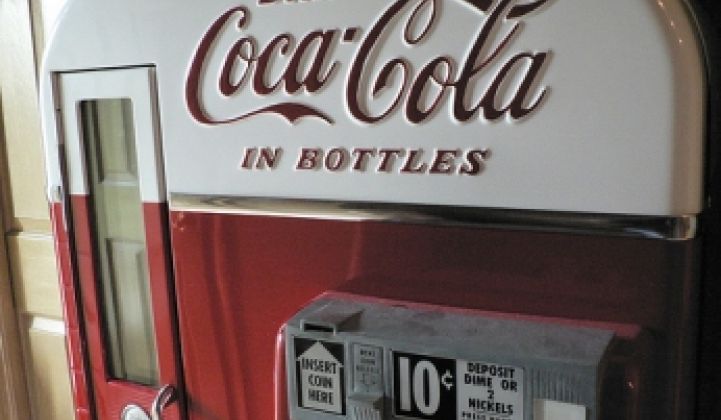Coca-Cola Enterprises, the bottling and distributing arm of the world's biggest purveyor of carbonated soft drinks, wants to reduce its corporate carbon footprint by 15 percent by 2020.
Presumably that doesn't mean Coke will be selling flat soda in the future.
Instead, the Atlanta-based company has promised to cut the carbon footprint of its business operations by 15 percent from its 2007 levels, under a set of five sustainability goals it calls "Commitment 2020."
That includes minimizing water use and returning as much water as it uses to the communities it operates in, as well as recovering 100 percent of its packaging as part of a broader recycling and renewable packaging strategy, it announced Wednesday.
Coca-Cola Enterprises is in a growing club of companies promising to operate in more environmentally friendly and socially conscious ways.
The Global Reporting Initiative, one of the most prominent standards-setting groups for corporate environmental and social issues, said that more than 1,000 organizations made reports based on its guidelines last year, up 46 percent from 2007.
Examples abound. Rival beverage giant PepsiCo, for instance, has pledged to cut water consumption by 20 percent, electricity by 20 percent and fuel by 25 percent by 2015 (see Top Ten Enterprise Customers: PepsiCo).
Pepsi also takes a top slot on the Environmental Protection Agency's list of green power purchasers, getting 100 percent of its power from renewable sources (see Government, IT Biggest Buyers of Green Power).
Both Pepsi and Coke are looking into vending machines that use compressed carbon dioxide to replace a set of gases known as F-gases (such as hydrofluorocarbons) that are potent global warming agents (see Study Calls Refrigerant, Air Conditioner Gases Threat to Environment).
The push to combat corporate contributions to global warming could spell opportunity for startups that can help. Coke, for one, is in the process of a full deployment with energy management software startup Hara (see Energy Management Startup Hara Nabs Coke as Client, $6M From Kleiner).
Consumer goods giant Procter and Gamble (NYSE: PG) cited its corporate sustainability goals – including plans to cut energy and water use, waste and carbon dioxide emissions at its plants by 20 percent by 2012 – when it announced a venture with biofuel startup LS9 that will seek to develop biologically based chemicals, such as surfactants used in detergent (see LS9, Procter and Gamble Ink Biochemicals Partnership).
Then again, corporate giants like IBM have their own set of carbon reduction strategies and services to pitch to clients (see IBM to Focus Supply Chain Heft on Green).
Of course, if Congress passes a nationwide carbon emission cap-and-trade system, that will add urgency to greenhouse-gas emission reduction efforts by companies that may be regulated under the legislation (see Come Get 'Em: Gov't Plans to Give Freebies Under Cap-and-Trade).
But many corporations are seeking to reduce their carbon footprints in advance of such legislation, whether to bolster green corporate images, to meet demands from investors or watchdog groups or as a byproduct of energy efficiency efforts (see Carbon Accounting: It's All About Appearances).
Whether Coca-Cola Enterprises' carbon footprint reduction push will filter down to its suppliers wasn't mentioned in this week's announcement. Last week saw the world's biggest retailer, Walmart, announced plans to subject its suppliers to a lengthy set of environmental and social sustainability reporting requirements (see Green Light post).
Coca-Cola Enterprises' existing carbon footprint reduction efforts have already led to a 7 percent cut in its energy use between 2006 and 2008, according to its 2008 corporate responsibility and sustainability report.
Image courtesy Flickr / CC BY-SA 2.0
Learn how to differentiate your company through greener product lines at Greening the Supply Chain on September 17 in Boston.




